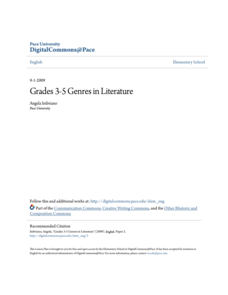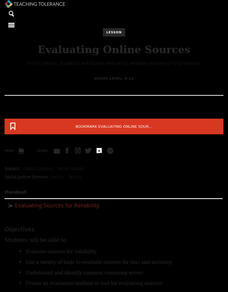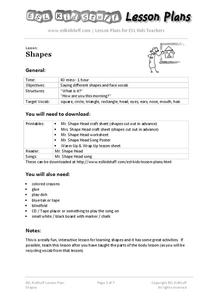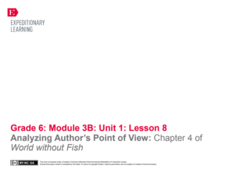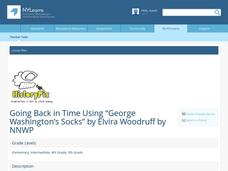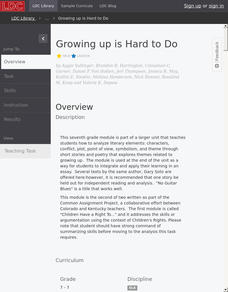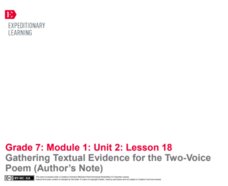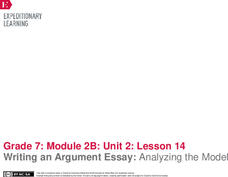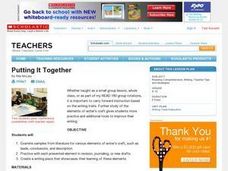EngageNY
Building Background Knowledge: The Desegregation of Schools and Brown v. Board of Education
Scholars gain interest in the case of Brown v. Board of Education by watching a video clip and completing a quick write. They then independently read excerpts from Brown v. Board of Education and work through a Steps for Getting the Gist...
EngageNY
Determining Cascading Consequences Using The Omnivore’s Dilemma: Hunter-Gatherer Food Chain
Focusing on the consequences of the hunter-gatherer food chain that Michael Pollan discusses in The Omnivore's Dilemma, teams work together to create hunter-gatherer food chain consequences charts. Next, scholars view other groups'...
EngageNY
Evaluating an Argument: The Polyface Local Sustainable
Who has the better argument? Class members work in small groups to compare the arguments on the Example of Strong and Flawed Arguments sheet. They then analyze Michael Pollan’s argument on pages 161–166 of The Omnivore’s Dilemma and...
PBS
Interviewing: The Art of Asking Questions
Interviewing skills are important, even outside of a news reporter's desk or employer's office. Take your class through the process of interviewing people they don't know with a set of case studies featuring journalists and various...
Curated OER
Making Your Sentences Work: Subject-Verb Agreement
Review subject-verb agreement with your class. Demonstrate the different verb forms when the subject is singular, plural, compound, and an indefinite pronoun. Not too long, this presentation is nonetheless thorough, especially for...
EngageNY
Discussing and Identifying Themes: What Makes a Good Children’s Book?
Working in small groups, scholars look closely at a children's book to evaluate narrative techniques. Next, they complete a Children's Book Scavenger Hunt worksheet to analyze the literary elements of their selected stories.
Pace University
Genres in Literature
Enthusiastic readers take part in a book club unit that focuses on genre, particularly historical fiction, fantasy, and adventure. Over the course of 10 days, groups read a variety of stories and choose leveled activities from a learning...
Teaching Tolerance
Evaluating Online Sources
Newspapers, television, social media ... how do people get their news? Using the informative resource, scholars locate and verify credible sources of information. Working in small groups, they discuss strategies for evaluating the...
ESL Kid Stuff
Intro ESL Lesson (Ages 3-7)
If you are working on colors, printing names, introductions, and other projects in the first few weeks of school, use a series of activities designed for English language learners. It includes cute ways to wish your little ones...
ESL Kid Stuff
Shapes
Work on shapes and body parts at the same time with a fun set of activities. Kids sing and read about Mr. Shape Head, who has shapes on his face, before making their own Mr. Shape Head.
EngageNY
Analyzing Author’s Point of View: Chapter 4 of World without Fish
Give me a clue. Scholars work in triads to use highlighters and mark clues that lead to the author's point of view in World without Fish. The Author’s Point of View graphic organizer helps them map out their thoughts.
School Journalism
Investigative and Data Journalism – Day One
A free press, free to investigate and report on responsibly, compelling stories, is essential to a democracy. A 10-slide presentation details where to get ideas, how to go about an investigation, gather data, and assure the accuracy of...
Institute for Humane Education
Selling "Boy" and "Girl"
Monster trucks, action figures, and video games. Are these toys designed for boys or girls? Scholars work in small groups to find and categorize examples of boy and girl toys from catalogs. Next, learners analyze the two sets of pictures...
State University of New York
Going Back in Time Using “George Washington’s Socks”
After reading Elvira Woodruff's George Washington's Socks, young readers and writers embark upon writing their own historically based story, with a focus on developing ideas and details throughout the piece. In small groups, class...
Literacy Design Collaborative
Growing up Is Hard to Do
Looking for a fountain of youth? Scholars analyze a group of texts by Gary Soto that pertain to the difficulties of growing up. Activities pertaining to vocabulary, close reading, and shared writing prepare learners for the final task of...
EngageNY
Mid-Unit 2 Assessment: Comparing Fictional and Historical Texts
Class members pair up to discuss how the author of A Long Walk to Water altered history. They then work independently on Mid-Unit 2 Assessment: Comparing Water for Sudan and A Long Walk to Water. Readers close the lesson plan...
EngageNY
Gathering Textual Evidence for the Two-Voice Poem (Author’s Note)
Writers take a look at how to gather evidence from the information text in the unit that connects to Salva and Nya’s story. They complete a Gathering Evidence from Informational Texts sheet to guide their work. Pupils then use the...
EngageNY
Writing an Argument Essay: Analyzing the Model
Class members analyze the model essay to determine the given claim and the evidence to support it. They use an Analyzing Evidence in the Model Essay sheet to help guide their work. They then begin to analyze the structure of the essay by...
EngageNY
Writing an Analysis Essay: Introducing the Writing Prompt and the Model Essay
A model analysis essay provides writers with an opportunity to examine a response to the end-of-unit assessment writing prompt. Scholars define key words in the prompt and discuss how the model essay meets the demands in the prompt....
EngageNY
Selecting Evidence and Partner Writing: Aligning “The Hero’s Journey” and The Lightning Thief (Chapter 5)
Around and around we go! Scholars work in groups to connect The Hero's Journey and The Lightning Thief with a Carousel of Quotes activity. They then independently reflect on the two texts and answer questions about how they...
Prestwick House
The Poetry of Bob Dylan
Bob Dylan's selection as the 2016 winner of the Nobel Prize for Literature, the first songwriter ever to receive the honor, has focused the attention of a new generation on the work of the legendary artist. Class members...
Curated OER
Shakespeare: Standing on the Bookshelves of Giant
A phenomenal lesson on Shakespeare! Middle and high school learners create WebQuests about the texts and authors that Shakespeare himself studied when he was in grammar school. They use a variety of media in order to create dramatic...
EngageNY
Synthesizing Research: How Colonists Were Interdependent
Following the formative assessment of this unit, young scholars present the information they gathered on their specific colonial trade to the rest of the class. Working in groups, learners create posters describing the particular job...
Curated OER
Putting It Together in Writer's Workshop
This lesson about writing can be taught in small groups or large group settings. They examine basic writing techniques and practice using them to improve their writing.






